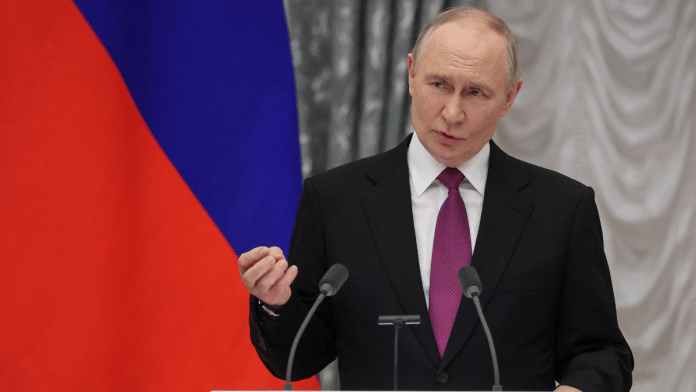Thank you dear subscribers, we are overwhelmed with your response.
Your Turn is a unique section from ThePrint featuring points of view from its subscribers. If you are a subscriber, have a point of view, please send it to us. If not, do subscribe here: https://theprint.in/
When Vladimir Putin lands in India, it will mark his first visit since the Ukraine invasion, and perhaps one of the most consequential moments in India – Russia relations since the Cold War’s end.
For Moscow, the visit is about optics, a demonstration that Russia, despite Western sanctions and diplomatic isolation, still commands high-level partnerships beyond Beijing. For New Delhi, it is about calibration, how to engage an old friend without appearing out of step with the realities of a changing global order.
Behind the ceremonial warmth and familiar rhetoric, the meeting carries real stakes. India has much to gain if it plays this right, and much to lose if it does not.
A Relationship in Transition
India – Russia ties have long been defined by nostalgia, defence hardware, shared vetoes, and a Cold-War sense of solidarity. Yet the world that sustained that comfort has shifted dramatically. Russia is now heavily dependent on China, its economy constrained by sanctions, and its international choices increasingly tactical rather than strategic.
India, on the other hand, has emerged as a swing state in global politics, courted by Washington, respected in Brussels, and still trusted in Moscow. This gives New Delhi leverage, but also exposes it to competing expectations. Putin’s visit therefore comes at a delicate moment: it can either renew the partnership on modern terms, or trap it in sentimental symbolism.
What India Should Seek
- Trade parity, not dependency
Bilateral trade has crossed $65 billion, but 90 percent of that is Russian oil and commodities. India must use the summit to push for genuine diversification, more Indian pharmaceuticals, machinery, textiles, and processed foods entering the Russian market. The long-proposed Chennai – Vladivostok maritime corridor should move from PowerPoint to port. And payment systems, still hampered by rupee convertibility issues, must be stabilised through third-country currency frameworks.
- Labour mobility with dignity
As Russia faces acute labour shortages, Moscow has sought Indian workers for its construction and manufacturing sectors. A mobility agreement could open valuable opportunities, but it must come with safeguards: verified contracts, fair pay, medical insurance, and repatriation clauses. Without these, India risks turning its citizens into soft targets within a fragile wartime economy.
- Defence cooperation with accountability
Russia remains India’s largest defence supplier, yet the Ukraine war has exposed supply bottlenecks, sanctions risk, and uncertain after-sales support. India should demand transparent timelines for spare-part deliveries, co-production rights, and joint maintenance facilities.
- Strategic autonomy, not symbolic alignment
New Delhi’s neutral stance on Ukraine has been a statement of principle, not partnership. During this visit, it must quietly convey that India’s friendship cannot mean endorsement of Moscow’s choices. India’s foreign policy success lies in its autonomy, not in being seen as anyone’s echo.
Where India Must Tread Carefully
- Managing Western perceptions
India’s balancing act between Moscow and Washington has so far been masterful, but it remains precarious. A high-profile Putin visit amid an unresolved European war could be read in the West as defiance rather than diplomacy. The challenge for India will be in the optics, engaging substantively with Moscow while signalling clearly that its partnerships remain issue-based.
- Avoiding sanctions and compliance traps
Russia’s economy is entangled in sanctions spanning finance, technology, and defence. Any new agreements must therefore withstand global scrutiny. Even inadvertent exposure could harm Indian banks and energy firms. Oil imports have already invited concern in Washington; additional trade must stay transparent and clearly decoupled.
- Recognising Russia’s new dependencies
The Russia of today is not the Russia of the 2000s. Its pivot toward China is unmistakable, and its leverage in the Global South increasingly transactional. India cannot afford to ignore this structural change. Partnerships must be designed to be China-proof.
- Guarding against domestic over-stretch
India must resist the temptation of grand, headline-driven announcements that later stagnate. Past projects, in nuclear energy, infrastructure, and defence offsets, often floundered on timelines and financing. The summit should prioritise executable, performance-linked deals that generate measurable domestic value.
Between Friendship and Foresight
Putin’s visit will test India’s diplomatic discipline as much as its strategic foresight. The task before New Delhi is to honour an old partnership without resurrecting old habits. It must demonstrate that loyalty does not preclude leverage, that historical comfort can coexist with hard-nosed clarity.
This requires walking a fine line: engaging Moscow as a partner of relevance, not reverence. Handled well, the visit can reaffirm India’s role as a power that talks to all but belongs to none, a nation confident enough to host Putin without apology, and pragmatic enough to do so strictly on its own terms.
Handled poorly, it could revive old doubts about India’s place in an increasingly polarised world.
These pieces are being published as they have been received – they have not been edited/fact-checked by ThePrint.


